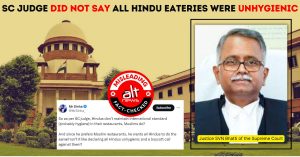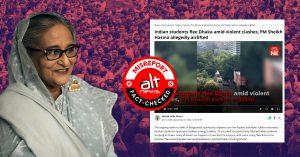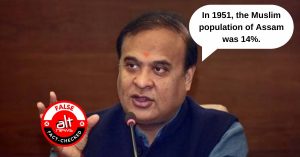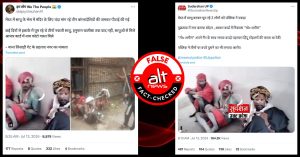Prime Minister Narendra Modi addressed the nation on June 7, days after the Supreme Court termed the centre’s vaccine policy “arbitrary and irrational”. He reversed the vaccine decentralisation strategy and said that the centre will provide free vaccines to states from June 21.
PM Modi claimed that the centre had earlier been “pressured” to decentralise vaccine policy. “From January 16 till the end of April this year, India’s vaccination program ran mainly under the supervision of the central government. The country was moving in the direction of providing free vaccines to all. The citizens of the country too were maintaining discipline and getting vaccinated when it was their turn. Meanwhile, several state governments again said that the vaccine work should be de-centralized and left to the states…We thought that when the states are making this demand and they have enthusiasm, so let’s give 25 per cent of the work to them,” he said.
The Prime Minister attempted to evade the responsibility for a vaccine policy widely criticised by the opposition, the Supreme Court and the media.
BJP leaders have also been blaming the states for first demanding decentralisation then asking for centralisation of vaccine procurement.
The hypocrisy of India’s opposition can’t be starker! They first demanded that vaccine procurement be decentralised, states be given autonomy. Once it happened and people started questioning them, they started passing the buck!
Their contribution to fighting the pandemic is ZERO. pic.twitter.com/fL03mAYxXP— Amit Malviya (@amitmalviya) May 13, 2021
Prime Minister makes misleading claims in his speech
India has 28 states and eight union territories. Out of the eight UTs, Delhi and Puducherry have elected assemblies and Kashmir is under the President’s rule. BJP governs 12 of these directly and six others in coalition governments. For the Prime Minister to claim that the centre took the decision to decentralise on April 19 following requests made by states, the demand should have come from a majority of the states. But 18 assemblies have BJP in power or in coalition and the rest, barring two, did not demand decentralisation.
West Bengal CM Mamata Banerjee wrote a letter to PM Modi on February 24, requesting that the state be allowed to purchase vaccines for inoculation ahead of the assembly elections.
West Bengal CM @MamataOfficial writes to PM @narendramodi for initiating a rapid vaccination process in West Bengal before elections are held.
Letter says, the West Bengal Government wants to provide vaccine free of cost to all the people. pic.twitter.com/2lyIgbBw8s— Ayushman Kumar (@Iam_Ayushmann) February 24, 2021
Banerjee’s request, however, wasn’t mandated and two months later when the centre liberalised vaccination, she said that the announcement was “much-delayed” and appears to be “hollow, without substance and a regrettable show of evasion of responsibility”. On April 22, she tweeted that the union government should fix one price for the vaccine “irrespective of who pays – centre or state” to ensure every Indian is vaccinated for free.
On April 8, Maharashtra Health Minister Rajesh Tope accused the centre of “discrimination” in the distribution of vials of Covaxin and Covishield. He alleged that BJP-ruled states were provided more doses. His allegation came a day after Union Health Minister Harsh Vardhan rebutted Maharashtra’s claim of shortage of vaccine doses. Several states, BJP and non-BJP, had been complaining of a vaccine shortage. On April 29, Tope said that CM Uddhav Thackeray has said that the state government is ready to pay for vaccines but doses are unavailable.
Thackeray wrote a letter to PM Modi on May 8 which said, “The State of Maharashtra is willing to procure the requisite stock of vaccines in a single procurement if possible, so as to safeguard our citizens and to give a boost to India’s vaccination program. However, the producers do not have enough stocks. If the States are allowed to procure from other manufacturers as well, we would be able to cover a larger population in a shorter time and help reduce the impact of the possible third wave of COVID.”
This letter was written after decentralisation was announced.
CM Uddhav Balasaheb Thackeray wrote to the Hon’ble Prime Minister Shri @narendramodi regarding the supply of vaccination, technical glitches on the CoWin App & developing a state-level app for citizens’ vaccination registration. pic.twitter.com/oMOX7kfdrA
— CMO Maharashtra (@CMOMaharashtra) May 8, 2021
On May 14, Maharashtra Health Minister demanded that the union government float a “single global” tender for procurement of vaccines on behalf of states to avoid “unhealthy competition”.
Apart from this, senior Congress leader Anand Sharma told The Indian Express on April 16 that state governments must immediately be allowed to enter into contracts for the procurement of vaccines. DMK leader MK Stalin wrote to PM Modi on April 18 “to allow independent procurement of drugs, vaccines and medical equipment by state governments”. He had tweeted on April 21 that states must receive central funding to procure vaccines as per their requirements.
It is noteworthy that Sharma is a Rajya Sabha MP and does not hold office in any state government. MK Stalin assumed Tamil Nadu CM’s office on May 7.
No other non-BJP state or opposition leader expressed willingness to directly procure vaccines
Alt News looked at the demands made by the states before and after April 19, i.e., when vaccine procurement was centralised and after PM Modi decided to decentralise the same. None of the states/ UTs were demanding that they should be allowed to purchase vaccines. In fact, the states governed by opposition parties criticised the centre’s decision within days of the PM announcing decentralisation of procurement. The collective demand was that the central government takes the responsibility of procuring vaccines and allocates appropriate quantities.
Former PM Manmohan Singh addressed a letter to PM Modi on April 18, advising that the centre drafts a plan to supply vaccines to states, barring 10 per cent that can be retained for emergency use. Singh wrote that the government should indicate how vaccines will be distributed. He did not talk about the decentralisation of procurement.
Key to our fight against Covid19 must be ramping up vaccination effort. We must resist temptation to look at absolute numbers being vaccinated, focus instead on percentage of population vaccinated: Former PM Dr. Manmohan Singh writes to PM Modi on ramping up vaccination programme pic.twitter.com/ZD5SbQOE0u
— Congress (@INCIndia) April 18, 2021
However, on April 8, Congress MP Rahul Gandhi had written another letter that said, “Give state governments a greater say in vaccine procurement and distribution.” The letter also stated, “Even though public health is a state subject, our states have been bypassed right from vaccine procurement to registration.”
#Congress leader #RahulGandhi writes to #PM #NarendraModi expressing concerns about #Covid19 vaccination program. The Congress leader also sought immediate moratorium on Covid19 vaccine exports in the letter to PM. pic.twitter.com/5GYuNtxR6z
— Mojo Story (@themojostory) April 9, 2021
This letter is being used by BJP leaders, including Union Minister Smriti Irani, to claim that Congress demanded decentralisation of procurement.
It must be pointed out that both Manmohan Singh and Rahul Gandhi do not represent any state.
There are no reports prior to April 19 suggesting that state governments were asking the centre to let them directly purchase vaccines from manufacturers. Odisha Chief Minister Naveen Patnaik had written a letter to PM Modi on March 30, requesting that COVID vaccines be made available outside the government supply chain in open markets for those who can afford to buy.
PM Modi portrayed in his June 7 speech that the decision to centralise procurement was taken because states failed to implement inoculation programs after decentralisation was announced. But most non-BJP-ruled states had maintained that they wanted centralised procurement.
After decentralisation was announced on April 19, Chhattisgarh Health Minister said the next day that the availability of scarce resources like COVID-19 vaccines should not be decentralised.
Kerala Chief Minister Pinarayi Vijayan requested PM Modi to reconsider his decision and supply vaccines to states free of cost. Former Kerala Health Minister KK Shailaja said that the Left would have nationalised healthcare if it was in power at the centre.
Maximum vaccination is required to crush 2nd wave of #COVID19. Requested @PMOIndia to reconsider new policy on vaccine distribution so that availability is assured & no additional financial burden is incurred, enabling States to perform constitutional obligation in health sector. pic.twitter.com/sEE6dpGzpE
— Pinarayi Vijayan (@vijayanpinarayi) April 20, 2021
Rajasthan Chief Minister Ashok Gehlot had tweeted on April 21, “I hope that PM Modi announces free vaccination for youth above 18 years.”
इसके लिए मैं उम्मीद करता हूं कि प्रधानमंत्री श्री @narendramodi जी 18 वर्ष से अधिक आयुवर्ग के लोगों के लिए भी फ्री वैक्सीनेशन की घोषणा करेंगे जिससे सभी नागरिकों को वायरस से सुरक्षा मिल सकेगी।
3/3— Ashok Gehlot (@ashokgehlot51) April 21, 2021
Health Minister of Rajasthan Dr Raghu Sharma said during a virtual press conference on April 25, “…it is the responsibility of the centre to make sure that states get vaccine supply as per demand.”
Punjab CM Capt Amarinder Singh sought central government funding for vaccination during a virtual meet with the PM on April 23.
On April 25, five opposition-ruled states — Rajasthan, Punjab, Chhattisgarh, Jharkhand and Kerala — said that the rollout of vaccines for 18-45 years category from May 1 will be delayed since the manufacturers have made it clear that they can negotiate future orders only after meeting their prior vaccine commitment to the central government. Chhattisgarh Health Minister TS Singh Deo said, “Union government is trying to misguide the people and transferring the onus on the states.” Jharkhand Health Minister Banna Gupta stated the Modi government should have figured out the supply chain before announcing the third phase of the vaccine strategy.
Edappadi K. Palaniswami, who was Tamil Nadu Chief Minister till May 6, wrote to Prime Minister Narendra Modi on April 26 terming the centre’s policy in Phase 3 of COVID-19 vaccination throughout the country as “inherently unfair”. He requested the centre procure and supply the entire required quantity of COVID vaccine for administering all groups. Palaniswami’s successor MK Stalin who assumed CM’s office on May 7, wrote to the PM on May 12 that the centre should procure vaccines and begin a free, universal mass vaccination campaign across the country.
Prominent opposition leaders P Chidambaram from Congress and AIMIM chief Asaddudin Owaisi also supported the centralisation of procurement.
The Delhi government had on April 8 requested the centre to open vaccination for all age groups. The government did not talk about the decentralisation of procurement. On May 24, Deputy Chief Minister of Delhi Manish Sisodia requested for centralised vaccine procurement and allocation policy.
There is no evidence to support Prime Minister Modi’s claim that states asked for decentralised procurement. Out of 30 elected assemblies, 18 are controlled by BJP either directly or through a coalition. Barring statements of two Chief Ministers, there are no reports of states wanting to purchase vaccines. Unless the union government’s decisions are based on cherry-picking statements of a few opposition leaders and completely ignoring its own state governments, the Prime Minister’s attempt to deflect the blame to the states is unfounded.
[Note: This report missed a portion of Rahul Gandhi’s letter to the PM which said that states have been overlooked right from vaccine procurement to registration. The portion has been added. MK Stalin’s statements, both before and after he took the office of Tamil Nadu CM, have also been added to the report.]
Independent journalism that speaks truth to power and is free of corporate and political control is possible only when people start contributing towards the same. Please consider donating towards this endeavour to fight fake news and misinformation.




